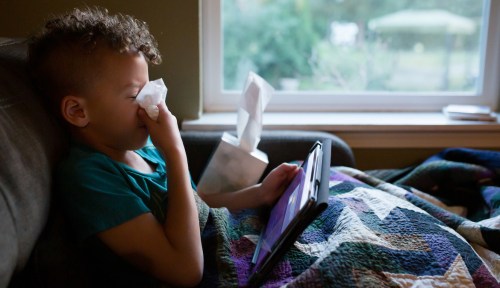You wake up with congestion, some fatigue, maybe a headache. You’re not dying, but you obviously aren’t totally fine either. So how do you know when to stay home from work? (Or if this is all happening with your kid, how do you know when to pull them from school?)
Experts in This Article
board-certified pediatrician and founder of Integrative Pediatrics and Medicine Studio City in Los Angeles
emergency medicine physician and chief medical officer at WellNow Urgent Care
It’s worth pointing out that “taking a sick day when necessary is crucial,” says Joel “Gator” Warsh, MD, a board-certified pediatrician and founder of Integrative Pediatrics and Medicine Studio City in Los Angeles. It gives you or your kid time to rest and get better while reducing the spread of germs to others in your community. “Additionally, prioritizing sick days fosters a culture that values self-care and consideration of others’ health, underlining the significance of putting well-being first,” he says.
All sounds great! But of course, there are real-world pressures and expectations to consider (not to mention sick day guilt). So, here’s exactly what you need to know about when to give yourself or your child a break.
When to stay home from work
Earlier this year, the Centers for Disease Control and Prevention (CDC) released updated recommendations on when to stay home if you’re sick with infections like the cold, flu, RSV, and COVID-19. Now, the go-to move is to just stay home anytime you have symptoms of a possible respiratory virus, including:
- Chest discomfort
- Chills
- Coughing
- Decrease in appetite
- Diarrhea
- Fatigue
- Fever
- Headache
- Muscle or body aches
- New loss of taste or smell
- Runny or stuffy nose
- Sneezing
- Sore throat
- Vomiting
- Weakness
- Wheezing
You can go back to work once your symptoms have been improving for 24 hours and you haven’t had a fever, the CDC adds.
If you absolutely need to go to work, “you should stay away from others as much as possible and wash your hands frequently to avoid spreading germs,” says Robert Biernbaum, DO, chief medical officer at WellNow Urgent Care. And definitely draw a hard line at a fever or flu-like symptoms like fatigue, body aches, or chills, he adds. “A fever is the biggest indicator that you have an infection and you need to stay home.”
But honestly? It’s better to not push yourself. “It can be tempting to try to power through when you’re not feeling well, but it’s always important to make sure you’re not putting anyone else at risk, and that you’re giving your body enough time to rest and recover,” Dr. Biernbaum says.
When to call out sick when you work remotely
There can definitely be some murkiness about sick days when you’re WFH, since you don’t have to stress about spreading germs and can basically stay in bed if you need to. That said, your own wellbeing still counts here, so don’t ignore it.
“The most important thing is to listen to your body and not push yourself too hard. If your symptoms are impairing your ability to focus or participate in virtual meetings, or you feel mentally or physically exhausted, that’s an indication that you need to sign off for the day to get some rest and stay hydrated,” Dr. Biernbaum says.
When to keep kids home from school
The list of stay-home symptoms from the CDC applies to kids and adults. Basically, you should give your kid a sick day any time they have any signs of a possible respiratory virus, including:
- Chest discomfort
- Chills
- Coughing
- Decrease in appetite
- Diarrhea
- Fatigue
- Fever
- Headache
- Muscle or body aches
- New loss of taste or smell
- Runny or stuffy nose
- Sneezing
- Sore throat
- Vomiting
- Weakness
- Wheezing
It’s also a good idea to check with your child’s school to see if they have any specific procedures or guidelines around when and how long to keep kiddos home when they’re not feeling well.
As for when your kid or teen says they’re sick and need to stay home, but you think they might be faking? “Children may exaggerate their symptoms to avoid attending school, however, there are ways to determine if they genuinely need time off: Observe for consistent symptoms,” Dr. Warsh says.
In other words, check to see if their complaints line up with their actions. If they say they have a sore throat or a tummy ache but they’re still eating and playing normally, they’re probably not actually sick.
That’s not to say something isn’t going on. Chances are your kid is feeling anxious or stressed about something, Dr. Warsh says. Take it as your sign to invite them to talk about what might be on their mind and brainstorm other ways to cope besides staying home.
When to go to the doctor
Have a mild cough or cold? You can probably manage at home and be back on your feet within a couple of days. But give your doctor a call if things start to get worse, recommends the Mayo Clinic. Think: A fever over 101°F that doesn’t break after three days, a fever going away and then coming back, shortness of breath, wheezing, or intense headache or sinus pain.
The threshold’s a little different for kids. Call the pediatrician if your child has a fever for more than two days or if they have severe coughing, wheezing or trouble breathing, ear pain, unusual fussiness or fatigue, or no interest in eating. You should also seek immediate medical care for infants 12 weeks and younger who have a fever of 100.4°F or greater, the Mayo Clinic recommends.
—reviewed by Jennifer Logan, MD, MPH
Sign Up for Our Daily Newsletter
Get all the latest in wellness, trends, food, fitness, beauty, and more delivered right to your inbox.
Got it, you've been added to our email list.











